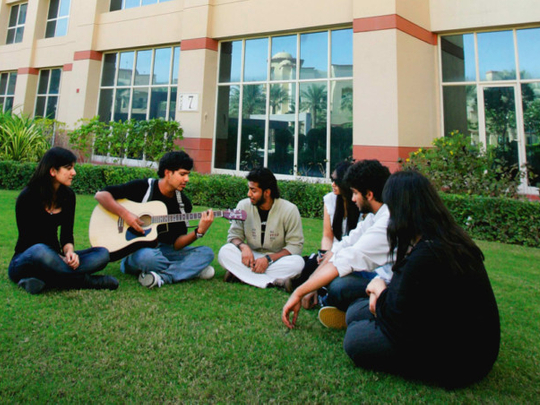
When Hyderabad-based Major Abhinav Chaudhary took voluntary retirement from the Indian Army, he decided to enrol in an MBA programme specialising in logistics and the supply chain at S P Jain School of Global Management’s Dubai campus. Chaudhary, who took up the course to build on his experience in the field of military logistics, is currently pursuing his third trimester at the school located in Dubai International Academic City (DIAC).
“The upcoming Expo 2020, an eye-catching human development index, world-class schools for children, well-developed public transport and ample career opportunities make Dubai the perfect place to settle down after completing the MBA,” says Chaudhary. “I am looking to start the second innings of my career here with a logistics company.”
For Samir Chaturvedi, a young graduate from Mumbai, a master’s degree in business from an institution in Dubai is the passport to a great career and plenty of advancement opportunities. After obtaining a BTech degree from Narsee Monjee Institute of Management Studies and working at Accenture for more than two years, he joined the global business course at S P Jain School of Global Management’s Dubai campus to fast-track his career.
“From the financial perspective, coming to the UAE is a very lucrative option. Combining the course fees and cost of living, a degree in the UAE costs a student around $40,000 (about Dh147,000) and he can also start working after a year of study. But if he pursues a master’s degree in the US, he will have to pay anything from $30,000-80,000, depending on the college and the city he chooses,” he says.
Chaudhary and Chaturvedi are among hundreds of Indian students now pursuing a broad range of courses at various campuses in the UAE, instead of heading west as they once did.
More reasons than one
Quality education from recognised institutions is one reason Indian students are coming to the UAE. “Dubai got an impetus when prestigious institutions from India set up campuses here,” points out Jayanti Ghose, an India-based career consultant and author of books on education and careers. Besides Indian universities such as S P Jain School of Global Management, BITS Pilani Dubai and Manipal University Dubai, the UAE hosts international arms of renowned universities such as INSEAD, New York University and Paris-Sorbonne University.
The cost of living is another issue that concerns most international students. The UAE has a lower cost of living than other higher education destinations such as Canada, the US, Australia and the UK. Hassle-free visa regulations also entice many students to apply for colleges here, while the home-away-from-home feeling is an added boost for those who prefer not to travel too far from their country.
International businesses, including those from India, have offices in the UAE, giving students valuable experience by way of internship programmes. The Institute of Management Technology (IMT) Dubai, which currently has around 250 students from India, has included a compulsory internship module in its popular MBA programme so that its students get hands-on experience. “Our students can study at more than 25 partner universities in Europe, the US and Asia for a semester without paying extra tuition fees,” says Cedwyn Fernandes, CEO, IMT Dubai.
The absence of cut-throat competition is also a major draw for many Indian students. “But this is only part of the reason for choosing the UAE,” says Ghose. “There are many private colleges and universities in India offering excellent infrastructure, updated curricula and industry interaction with far less competitive admission [criteria] into professional courses than government institutes.”
Economic viability
Ravi Panchanadan, CEO, Manipal Global Education, Middle East & Africa, agrees: “Renewed confidence in the UAE’s economy, a positive job market and the opportunity to live and study in a global economic hub are the main drivers attracting Indian students to study here.” The renowned university from Karnataka, which runs a campus at DIAC, enrols between 80 and 100 students every year directly from India.
The job offers that students almost always get after finishing their studies and visas that are easier to obtain than in the West are other factors. “In the past, it was definitely worthwhile to go to the US or the UK as it was considered a pathway to immigration, higher pay and a better lifestyle. But the scenario is different now,” says Prof. Christopher Abraham, Head of Dubai Campus and Senior Vice-President of Institutional Development, S P Jain School of Global Management. “The UK has abandoned post-study work visas and there are no jobs in the US. Students are forced to return to India and find it difficult to recover the high cost of education in the West. But in the UAE cost of education is lower and [degrees] ultimately lead to jobs, delivering a high return on investment.”
While students can choose from various mainstream and vocational programmes, colleges in the UAE also offer industry-specific courses geared towards the job market. While engineering and business are the top choices for Indian students, the demand for courses in culinary art, aviation, design, animation, hospitality management, and information technology is also gaining traction. n


